- News
- Guest-Blog-The-Shroud-Maker
Guest Blog - The Shroud Maker
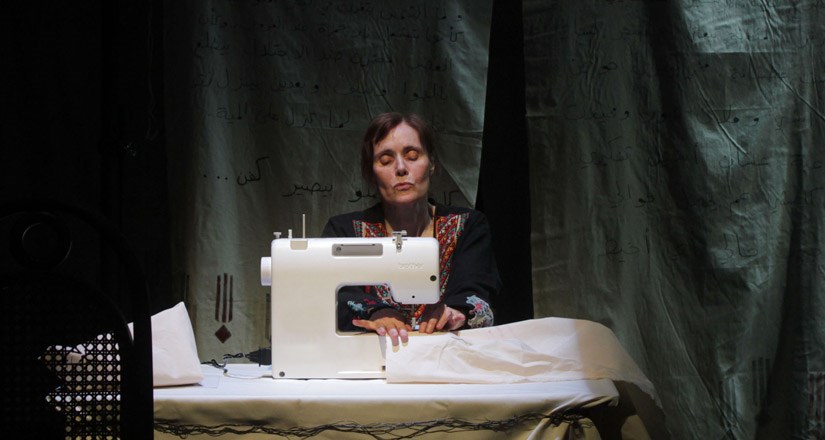
Inspired by real events, Ahmed Masoud's THE SHROUD MAKER tells the story of Hajja Souad, an 80-year old Palestinian woman living on the besieged Gaza Strip who has survived decades of wars and oppression by making shrouds for the dead. We spoke to Ahmed about the show...
ST: Though set in Gaza during decades of conflict, your play has been described as a black comedy. Did you start out with that aim or did the dark humour develop naturally during the writing of it?
AM: Yes, I wanted the play to have as much black comedy as possible. Hajja Souad (the main character) is a survivor of war, displacement, identity loss, humiliation, soldiers and bullets. However, she has nothing left to lose in her octogenarian years apart from her sewing machine and a few shrouds to sell. She laments a past that could have been very different, growing up as a top designer in London, Paris or Milan.
Sarcasm and humour is an important aspect of Palestinian life, I grew up in the Gaza Strip and I remember my family members are laughing in the face of occupation and military checkpoints. We have endless jokes on Yasser Arafat, the Israelis, Hamas, Fateh – you name it. The absurdity of the situation makes more creative with our jokes.
ST: Of all the turbulence in the world over the last five years, the situation for Palestinians may have been the saddest and most desperate. How have you reconciled writing such a play during such times?
AM: I wrote a few initial ideas for the play during that last 2014 Israeli assault on Gaza. Back then, I was reading the news every night before I went to bed, making sure I read all the names of the injured/killed to be sure that my family and relatives weren’t amongst them. I didn’t want to go to bed, I didn’t know what I was going to wake up to. One day, I was reading a local news website and came across a woman who had her shop open selling shrouds. When asked why she was still working, she replied “Because I don’t give a f***”. So I started imagining her life and wanted to know more about her, I created a fictional narrative around her and how she got there. It was the first night ever that I laughed so much with that woman who was a hero to me.
At the same time, the person who led the Israeli attacks, major Ghassan Ellian actually had Palestinian roots, which made me wonder. How could someone with roots and connections to the land and people he is killing have the guts to do so? What does it take? So I started imagining his life’s journey too and somehow, his and Hajja Souad’s journeys met.
ST: How and why did you decide on a one-woman show? Presumably the actor has been chosen and is well known to you?
AM: I wanted the play to be a one woman show so it draws on a strong tradition of storytelling in Palestine and the Arab World in general. I grew up with the ‘Hakawati’ (story teller), a local old man who would come every week to the local café and tell stories from the Crusaders era, the Mamluk’s, the Ottoman Sultan…etc. I wanted to continue this tradition and bring the story of Palestine through a personal experience of a woman who has lived decades of injustice and survival.
Julia Tarnoky is an excellent actor who has been praised for her ability to represent different characters on stage. She is well known in the theatre scene and has done various one woman shows.
ST: What reaction do you expect from audiences and what would you want`?
AM: I would like audiences to immerse themselves in the personal journey of this woman, focussing mostly on her humanity and love for life and willingness to survive despite all the odds.
I would like them to be transported to Gaza and Palestine for the duration of the show and I would like to leave them there to think of the people rather than politics and news bulletin.
ST: What does the elderly shroud maker represent for you in the long and terrible history in Gaza?
AM: Survival. The official symbol of Gaza City is the Phoenix because the city is always reborn after being destroyed. The main statue in the big square in Gaza City is the lower jaw of the phoenix to represent this reality. Gaza is an old historical city with a great civilisation. The Shroud Maker aims at highlighting the importance of this City in our modern day civilisation.
ST: I think many people in the audience will want to come away feeling more positive about the future. Is that part of your aim?
AM: We can only feel positive if we connect properly with the people and their humanity and stop thinking about them as part of a political drama. The Shroud Maker aims to do that. Hajja Souad’s insistence on carrying on and surviving is her way of offering a positive outcome. Those who believe in a better future will carry on doing what they do and survive no matter what the politicians and/or hardliners want.
The Shroud Maker plays on 3 March for one special performance. Book your tickets [here].

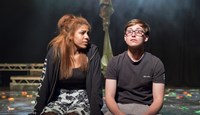


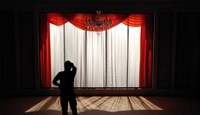
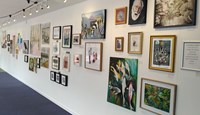
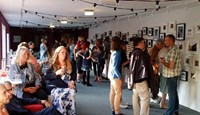
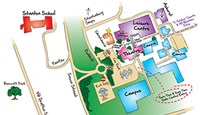
Conversations